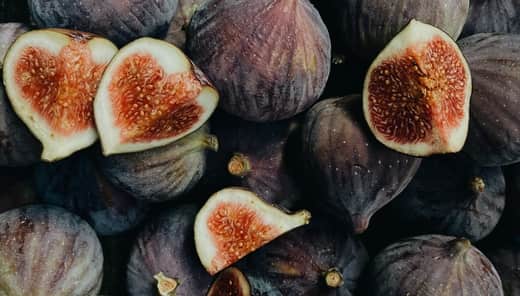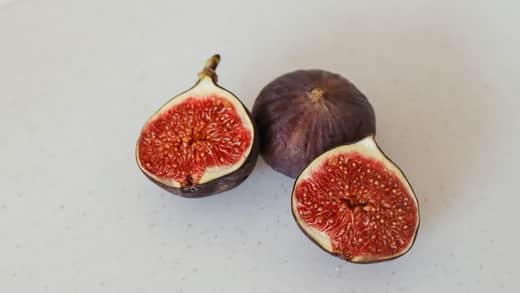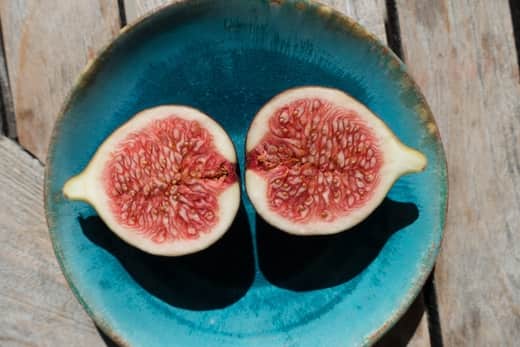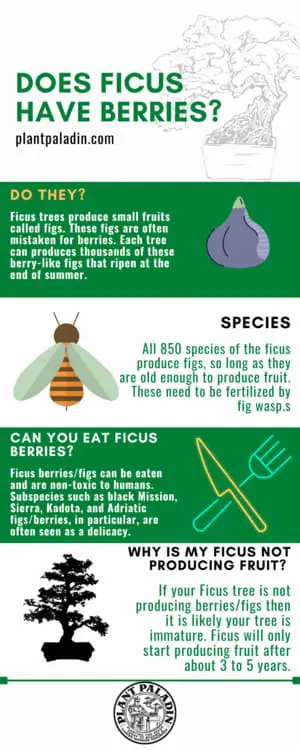This website is supported by its readers. If you click one of my links I may earn a commission. I am also a participant in the Amazon affiliates program and I will also earn a commission from qualified purchases.

One of the most popular types of indoor trees many of us opt for is Ficus trees. These tropical species come in over 850 species and species such as Ginseng Ficus make for excelling bonsai trees. One question I had, however, before keeping these trees was do Ficus trees have berries?
Ficus trees produce small fruits called figs. These figs are often mistaken for berries. Each tree can produces thousands of these berry-like figs that ripen at the end of summer. Ficus trees are also commonly referred to as Fig trees.
So do ficus trees have berries that are edable? And are these figs toxic to pets such as dogs or cats? Keep reading to find out more!
Just a quick heads up, over the past three years of running Plantpaladin, hundreds of people have asked for product recommendations. As such, You can find my favorite indoor bonsai tree here (link takes you to Bonsaiboy), my favorite outdoor bonsai tree (link takes you to Bonsaiboy), or have a look at all the products I recommend here.
Do Ficus trees have berries?
So I’ve kept my Ficus bonsai for a good two years now and during the summer growing season, I still have not seen any flowers or fruit appear on my tree.
This got me thinking if Ficus trees have berriest or if that was just an urban legend I came across.
To get to the bottom of this I got in touch with my local botanical gardens. Reached out to a few plant experts, grew out my own Ficus, and even reached out to 20 plant paladin readers to answer the question of doing Ficus trees have berries.
To summarize:
- Ficus trees in the wild produce small fruit called figs.
- These small fruits are often mistaken for berries due to their size and appearance and so the term Ficus berries are fifteen used interchangeably with the term Ficus Fig or Fig.
- Ficus trees will typically produce these berries/figs during the late summer in August. It will bloom once to twice per year.
- These berries/figs are fertilized by specialist Fig wasps and can survive in harsh conditions, not even needing topsoil to sprout new growth.
- These berries/figs will vary in size spending on the species of Ficus, most however will resemble small pear-shaped berries and typically come in a variety of colors such as black, green orange, purple, yellow, and red.
- Ficus trees that are kept indoors will not produce fruit as the specialist Fig wasps will need to pollinate the plant before it can produce fruit.
- Each of the figs/berries that the Ficus tree produces contains hundreds of tiny seeds.
What does Ficus fruit look like?
The figs/berries Ficus produces will look like small miniaturized pears/berries. figs will range from half an inch to three inches. figs will typically come in a variety of colors such as black, green, purple, and yellow.
The interior of the figs/berries will have a mushy, red interior with hundreds of small seeds. The surrounding area of figs will have a bright white outline.
The exact color, shape, and size of the figs/berry of your Ficus fruit will vary depending on the species of your tree.
Dalmatie and brown turkey figs tend to produce the largest-sized fruit.
Hopefully, the images below will help give some examples of what figs look like:


What are the different varieties of Ficus berries?
Ficus figs/berries come in a large number of varieties shapes and sizes, some of the most common include:
- Black mission
- Brown Turkey
- Tiger
- Sierra
- Kadota
- Calimyrna
- Adriatic
Do Ficus berries smell?
Ficus figs/berries have a sweet honey-like smell to them when they ripe. This scent is often amplified when figs have been dried. figs will typically only smell foul if the fruit has over-ripened. If overripened this smell will have a strong, vinegar-like smell.
This is common for other tree species whereby if the fruit/tree smells, it’s typical because of a fungal condition.
How often does Ficus produce berries?
Ficus will typically produce berries/figs near the end of summer, typically around august. More mature Ficus trees will produce two harvests. Once in the early summer on older branches and then again in the late summer on newer branches.
Typically the first harvest also known as the breba crop of figs from a Ficus will usually be inedible.
These berries will typically be smaller, more bitter to taste, and frequently inedible.
Ficus will typically only start to produce fruit once they reach maturity which is typically after 3 to 4 years.
Once mature, Ficus can produce figs for several decades if maintained well.
Can you eat Ficus berries?
Ficus berries/figs can be eaten and are non-toxic to humans. Subspecies such as black Mission, Sierra, Kadota, and Adriatic figs/berries, in particular, are often seen as a delicacy.
If you are unsure of the species of Ficus Fig/berry however avoid eating it as some figs have a bitter taste.
Avoid eating wild figs from trees if you do not know the sub-species.
Weeping Fig for example is one sub-species of Fig that still produces fruit however its berries/figs are typically smaller in size and bitter to taste.
figs that are harvested earlier in the summer will typically be bitter to taste so are often deemed inedible.
Benefits of eating Ficus berries?
Eating figs from a sub-species of Ficus that produces edible figs such as Black mission or Turkey figs has several health benefits including:
- Better digestion
- High in antioxidants
- Support healthy blood pressure
- Rich in calcium for bone health
- Can aid in weight management
Who should avoid eating Ficus figs/berries?
Ficus trees typically contain both birch pollen and natural latex. Both of which can cause allergic reactions. figs then should be avoided should you react to these
How to eat Ficus berries?
To eat Ficus berries/figs, was the outside thoroughly. Use a knife to cut off the stem and then consume. figs can then be eaten raw, either with the skin on or with the skin peeled.
figs can also be used in cooking cakes, puddings, salads, and jams
Are Ficus berries toxic?
Ficus berries/figs are typically non-toxic to people. Some figs however can be bitter to taste. Eating too many Ficus berries/figs and consuming them with the seeds can however cause gastrointestinal discomfort, bloating, and increased pressure on the liver and kidneys.
Are Ficus berries toxic to dogs?
Ficus berries/figs are toxic to dogs and should not be fed more than two figs per week. figs can cause dehydration, skin irritation vomiting, and diarrhea if excess figs are eaten by dogs. Irritation can be caused in dogs if any part of the Fig is eaten.
Are Ficus berries toxic to cats?
All parts of figs/Ficus berries are toxic to cats. figs can cause mild skin irritation, rashes, vomiting, and diarrhea. This is true of every part of the Fig/berry including leaves, skin, seeds, and flesh. Seek immediate veterinary care if you suspect your pet has eaten figs.
Do Ficus berries have seeds?
Ficus berries/figs contain hundreds of tiny teardrop-like seeds located inside the flesh of the figs. These seeds, if fertilized by Fig wasps can grow into Ficus trees of their own.
To read up more on this check out my post on do Ficus trees have seeds here.

Do Ficus bonsai produce fruit?
Ficus bonsai trees will typically not produce fruit. This is because Ficus bonsai is most commonly kept indoors and so Fig wasp will not be able to pollinate your tree, preventing it from creating fruit.
Why is my Ficus not producing fruit?
If your Ficus tree is not producing berries/figs then it is likely your tree is immature. Ficus will only start producing fruit after about 3 to 5 years. Ficus trees will only produce fruit if fertilized by Fig wasps.
Can you grow Ficus berries at home?
If you keep your tree indoors at home there is a good chance your tree will not produce fruit as it has not been fertilized by wasps. Ficus only produce figs/fruit if fertilized by specifics wasps and without these, your tree will not produce any figs/berries.
How to stop Ficus tree berries?
To prevent your Ficus from dropping berries/figs consider moving your Ficus tree indoors. Ficus requires wasps to pollinate and help produce the figs/berries that Ficus drop. Moving your Ficus inside will prevent these wasps from being able to pollinate your tree.
Alternatively, if your Ficus is grown outside and planted in the ground, consider using a positive to keep the wasps away from your tree.
Fruit thinning products can also be used which will drastically reduce the yield of figs/berries that your Ficus will produce.
Chemicals and solutions like Ethephon work well for this.
Professionals however will typically have to use these chemicals as they are not typically accessible by general gardeners like you and me.
My top picks for the gear you will need!
So like I mentioned earlier, over the past three years of running PlantPaladin, hundreds of people have asked me for my recommendations on the best bonsai gear on the market.
Having spent thousands of dollars on bonsai items these past few years and tested at least 100 bonsai-specific products, I’ve listed my favorite products below – All of which I highly recommend and think you can get great value.
They can purchase directly by clicking the link to take them to Amazon.
Bonsai Tool Set: One of the significant challenges I’ve had is finding a toolset that was not only durable but didn’t break the bank. SOLIGT has recently developed a fantastic bonsai tool set that covers all the tools you need to trim, prune, and repot your trees. – You can grab it here.
Complete Bonsai Set: Many of you will want to grow your bonsai trees entirely from scratch, but finding the varicose seeds, pots, and other items in one place can be challenging. Leaves and Sole then have created a complete bonsai set that I’ve personally used that ticks all the boxes. You can grab it here.
Bonsai wire: The number of times I’ve run out of wire for my bonsai or purchased cheap bonsai wire that doesn’t do the job is embarrassing for me to admit. After a lot of trial and error, I found that using Hotop’s aluminum bonsai wire is one of the best options on the market. This can easily be used for both indoor and outdoor bonsai. You can grab it here.
This post was written by Fehed Nicass who has been passionate about bonsai for over 3 years. He currently resides in the UK and works in sales.

